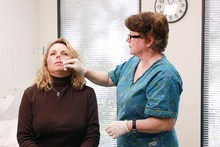Live attenuated influenza vaccine

Nurse administering the FluMist product
|
|
| Vaccine description | |
|---|---|
| Target disease | Influenza |
| Type | Attenuated virus |
| Clinical data | |
| Trade names | FluMist, Fluenz |
| Pregnancy category |
|
| Routes of administration |
Intranasally |
| ATC code | |
| Legal status | |
| Legal status |
|
| Identifiers | |
| ChemSpider |
|
|
|
|
Live attenuated influenza vaccine (LAIV) is a type of influenza vaccine in the form of a nasal spray that used to be recommended to prevent influenza. In June 2016 the CDC stopped recommending the use of LAIV as its effectiveness has appeared to have decreased between 2013 and 2016.
It is an attenuated vaccine, unlike most influenza vaccines, which are inactivated vaccines. LAIV is administered intranasally, while inactivated vaccines are administered by intramuscular injection. Both live attenuated and inactivated vaccines are typically trivalent. That is, they contain material from three different influenza virus strains recommended by national and international public health agencies as most likely to be protective against seasonal influenza in any given year. LAIV is sold under the trade name FluMist in the United States and Canada, and Fluenz in Europe. FluMist is manufactured by MedImmune and was first introduced in 2003.
In 2016 the CDC recommended that LAIV not be used for the 2016-2017 flu season and instead another type of influenza vaccine be used. This is due to the poor effectiveness of this type of vaccine between 2013 and 2016 with it being non effective during the 2015-2016 season. A 2012 review found that LAIV prevents influenza in about one out of six children under six it is given to. It was believed to prevent about 50% more cases of flu than the flu shot in younger children. In those less than 2 years old evidence the evidence was however unclear. Why there appears to be a decrease in effectiveness is unknown.
It is possible for individuals vaccinated with FluMist to spread the virus to others for up to 21 days after vaccination. For this reason it is recommended that those vaccinated with FluMist avoid close contact with individuals with weak immune systems during that time.
Even though the virus in LAIV is attenuated (low in virulence), it is still a living virus, and may cause an infection with complications in people with weakened immune systems or other underlying medical conditions. As of 2010, LAIV is recommended only for people 2–49 years of age, and is not recommended for people who have a weakened immune system, for pregnant women, or for people with certain chronic diseases. In contrast, inactivated virus vaccines contain no living virus, and cannot cause a live infection. Persons receiving LAIV may shed small amounts of the vaccine virus during the first week. People coming in contact with the vaccinated person are not considered to be at risk, unless their immune systems are severely weakened (for example, bone marrow transplant recipients).
...
Wikipedia
